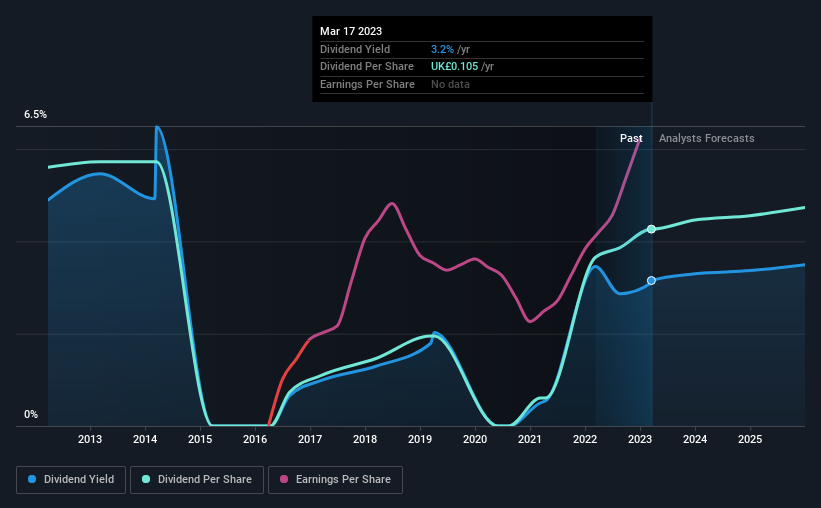
Balfour Beatty plc's (LON:BBY) dividend will be increasing from last year's payment of the same period to £0.07 on 5th of July. Although the dividend is now higher, the yield is only 3.2%, which is below the industry average.
See our latest analysis for Balfour Beatty
Balfour Beatty's Payment Has Solid Earnings Coverage
The dividend yield is a little bit low, but sustainability of the payments is also an important part of evaluating an income stock. However, Balfour Beatty's earnings easily cover the dividend. As a result, a large proportion of what it earned was being reinvested back into the business.
Over the next year, EPS is forecast to fall by 23.2%. If the dividend continues along the path it has been on recently, we estimate the payout ratio could be 33%, which is comfortable for the company to continue in the future.

Dividend Volatility
Although the company has a long dividend history, it has been cut at least once in the last 10 years. The dividend has gone from an annual total of £0.138 in 2013 to the most recent total annual payment of £0.105. Doing the maths, this is a decline of about 2.7% per year. Declining dividends isn't generally what we look for as they can indicate that the company is running into some challenges.
The Dividend Looks Likely To Grow
Given that the dividend has been cut in the past, we need to check if earnings are growing and if that might lead to stronger dividends in the future. Balfour Beatty has impressed us by growing EPS at 16% per year over the past five years. Growth in EPS bodes well for the dividend, as does the low payout ratio that the company is currently reporting.
We Really Like Balfour Beatty's Dividend
Overall, we think this could be an attractive income stock, and it is only getting better by paying a higher dividend this year. The company is generating plenty of cash, and the earnings also quite easily cover the distributions. We should point out that the earnings are expected to fall over the next 12 months, which won't be a problem if this doesn't become a trend, but could cause some turbulence in the next year. All of these factors considered, we think this has solid potential as a dividend stock.
It's important to note that companies having a consistent dividend policy will generate greater investor confidence than those having an erratic one. Still, investors need to consider a host of other factors, apart from dividend payments, when analysing a company. Case in point: We've spotted 3 warning signs for Balfour Beatty (of which 1 is significant!) you should know about. Is Balfour Beatty not quite the opportunity you were looking for? Why not check out our selection of top dividend stocks.
Valuation is complex, but we're here to simplify it.
Discover if Balfour Beatty might be undervalued or overvalued with our detailed analysis, featuring fair value estimates, potential risks, dividends, insider trades, and its financial condition.
Access Free AnalysisHave feedback on this article? Concerned about the content? Get in touch with us directly. Alternatively, email editorial-team (at) simplywallst.com.
This article by Simply Wall St is general in nature. We provide commentary based on historical data and analyst forecasts only using an unbiased methodology and our articles are not intended to be financial advice. It does not constitute a recommendation to buy or sell any stock, and does not take account of your objectives, or your financial situation. We aim to bring you long-term focused analysis driven by fundamental data. Note that our analysis may not factor in the latest price-sensitive company announcements or qualitative material. Simply Wall St has no position in any stocks mentioned.
About LSE:BBY
Balfour Beatty
Balfour Beatty plc finances, designs, develops, builds, and maintains infrastructure in the United Kingdom, the United States, and internationally.
Excellent balance sheet and fair value.


